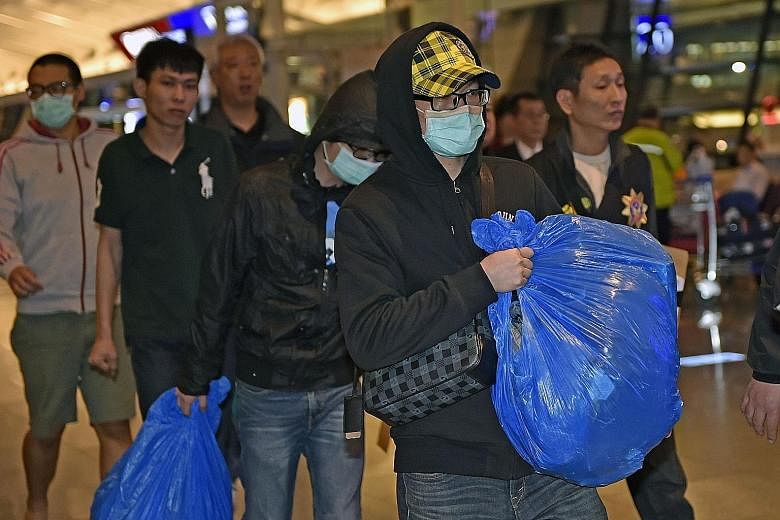Singaporean Fred Lin, 34, who runs a restaurant in Shanghai, last month received an SMS message from the supposed customer service hotline of China Merchants Bank, where he has an account.
The message said his Internet banking service was expiring unless he updated his personal particulars through a link provided.
He clicked the link which brought him to what looked like the bank's official log-in webpage and he confirmed the "update" of his particulars by keying a verification code sent in another SMS message.
But Mr Lin, who has been in China for 10 years, felt a tad suspicious and immediately logged into the mobile banking app to check the balance in his account. Within minutes, his entire bank balance of around 6,000 yuan (S$1,245) had been siphoned off by telecoms fraudsters.
"I have received such scam messages in the past and avoided becoming a victim as there were clear alarm bells. This time it appeared authentic, coming from the bank's official hotline and the log-in webpage looked bona fide," he told The Straits Times.
-
Modus operandi
-
According to local media reports based on interviews with deported Taiwanese suspects, telecoms scam syndicates tend to operate in groups.
First, a group of phone operators would pretend to be civil officers and alert their targets to some fabricated problems with their banking or medical insurance accounts.
Next, another group of operators would make follow-up calls and offer help to solve the problem.
The fraudsters would even use software to show a pseudo caller ID from a mainland police station. They would also play a recording of ambient noise from police stations or hospitals in the background.
At this stage, the aim is to obtain detailed information from the targets, such as their names, family situations, occupations, income and, most importantly, information related to their bank accounts.
The victims would then be guided to transfer money to a third-party account belonging to the fraudsters.
Kor Kian Beng
Scams like this have become more rampant in China in recent years, registering a 20 per cent to 30 per cent spike and losses of at least 10 billion yuan yearly. Only 200,000 yuan has been recovered so far. Last year, there were 590,000 cases involving losses of 22.2 billion yuan.
The trend has sparked a cross-strait spat between China and Taiwan after a group of 45 Taiwanese suspects was deported to the mainland from Kenya.
Beijing says the suspects should face investigation and prosecution in China because most victims are mainlanders.
Official statistics released by state media showed that Taiwanese were involved in about one in five telecoms fraud cases on the mainland and accounted for over half of total losses. Nearly all major cases - those involving losses of over 10 million yuan - were linked to Taiwanese-operated syndicates.
Analysts say mainland Chinese are singled out because they are seen as easy targets and have deeper pockets.
Beijing-based economist Hu Xingdou, who studies societal trends, told The Straits Times: "Mainland Chinese tend to view themselves as defenceless against the authorities, especially the powerful judicial officials. Unlike citizens in other countries who believe in the rule of law, mainland Chinese also tend to believe that money can be used to settle matters."
Another key reason for the spike in scam cases is the lack of personal privacy protection on the mainland, which makes it easy for syndicates to obtain personal details.
Another crucial factor has to do with the great lengths conmen go to to make the fraud schemes seem believable, say experts.
In most cases, perpetrators would pretend to be from the the judicial authorities, such as police officers or prosecutors. They would make up stories that targets face possible criminal charges before offering to make the problems go away in exchange for money.
Chinese media reported that telecoms scams began in Taiwan in the late 1990s, and that such syndicates had initially set up base on the mainland to target Taiwanese victims.
But tighter enforcement and greater awareness of such scams among the Taiwanese have forced the fraudsters to shift operations to third-party countries, such as Kenya, Malaysia, Indonesia and Egypt.
They began targeting mainlanders from around 2002. There are reportedly around 100,000 Taiwanese involved in telecoms scams targeting mainland Chinese.
A report in The China Post, a Taiwanese English-language daily, on Monday said the relatively low starting salaries for Taiwanese youth make it "extremely hard for fresh graduates to resist the temptation of an above-average pay cheque and a well-to-do lifestyle by making phone calls to strangers".
It added that lenient Taiwanese laws are partly to blame. The criminal law in Taiwan states that those convicted of telecoms fraud could face imprisonment of not more than five years. But the conviction rate is less than 10 per cent and the punishment often meted out is imprisonment of less than two years, a penalty which can converted into fines.
China's actions in seizing Taiwanese suspects from Kenya mark a break from joint enforcement efforts dating back to 2009 when Beijing and Taipei inked a pact that formalised criminal-justice cooperation. The pact had helped nab more than 7,700 telecoms scam suspects. About 4,600 of them were from Taiwan, reported Xinhua.
Chinese officials say Beijing needed to act differently this time because of ineffective enforcement by the Taiwanese side on such scams.
But cross-strait experts say a key reason was to pressure Taiwanese president-elect Tsai Ing-wen into showing acceptance of the so-called 1992 Consensus that there is one China but with each side having different interpretations of what that means.
Politics aside, Mr Lin believes the top priority should be to seek redress for the victims of telecoms scams. "No matter where they are from or where they are brought to, these suspects should be held responsible for what they did."


